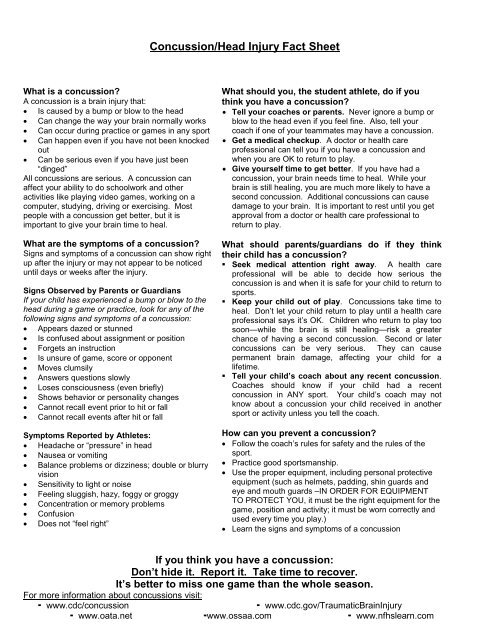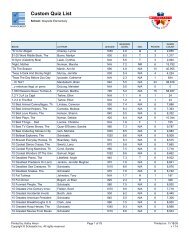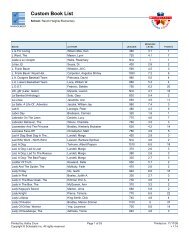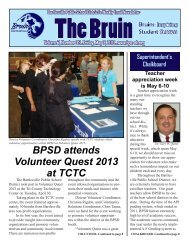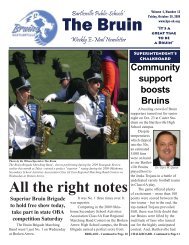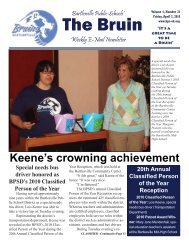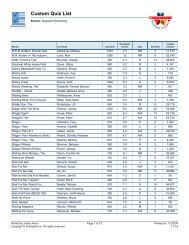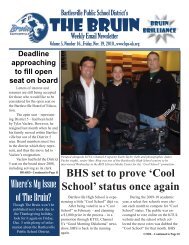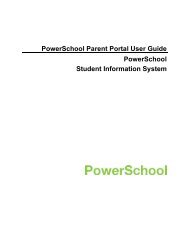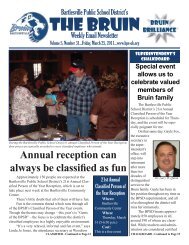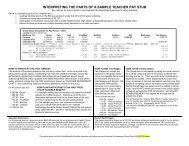PHYSICAL FORMS COMPLETE SET 2012-13.pdf - Bartlesville ...
PHYSICAL FORMS COMPLETE SET 2012-13.pdf - Bartlesville ...
PHYSICAL FORMS COMPLETE SET 2012-13.pdf - Bartlesville ...
You also want an ePaper? Increase the reach of your titles
YUMPU automatically turns print PDFs into web optimized ePapers that Google loves.
Concussion/Head Injury Fact Sheet<br />
What is a concussion<br />
A concussion is a brain injury that:<br />
• Is caused by a bump or blow to the head<br />
• Can change the way your brain normally works<br />
• Can occur during practice or games in any sport<br />
• Can happen even if you have not been knocked<br />
out<br />
• Can be serious even if you have just been<br />
“dinged”<br />
All concussions are serious. A concussion can<br />
affect your ability to do schoolwork and other<br />
activities like playing video games, working on a<br />
computer, studying, driving or exercising. Most<br />
people with a concussion get better, but it is<br />
important to give your brain time to heal.<br />
What are the symptoms of a concussion<br />
Signs and symptoms of a concussion can show right<br />
up after the injury or may not appear to be noticed<br />
until days or weeks after the injury.<br />
Signs Observed by Parents or Guardians<br />
If your child has experienced a bump or blow to the<br />
head during a game or practice, look for any of the<br />
following signs and symptoms of a concussion:<br />
• Appears dazed or stunned<br />
• Is confused about assignment or position<br />
• Forgets an instruction<br />
• Is unsure of game, score or opponent<br />
• Moves clumsily<br />
• Answers questions slowly<br />
• Loses consciousness (even briefly)<br />
• Shows behavior or personality changes<br />
• Cannot recall event prior to hit or fall<br />
• Cannot recall events after hit or fall<br />
Symptoms Reported by Athletes:<br />
• Headache or “pressure” in head<br />
• Nausea or vomiting<br />
• Balance problems or dizziness; double or blurry<br />
vision<br />
• Sensitivity to light or noise<br />
• Feeling sluggish, hazy, foggy or groggy<br />
• Concentration or memory problems<br />
• Confusion<br />
• Does not “feel right”<br />
What should you, the student athlete, do if you<br />
think you have a concussion<br />
• Tell your coaches or parents. Never ignore a bump or<br />
blow to the head even if you feel fine. Also, tell your<br />
coach if one of your teammates may have a concussion.<br />
• Get a medical checkup. A doctor or health care<br />
professional can tell you if you have a concussion and<br />
when you are OK to return to play.<br />
• Give yourself time to get better. If you have had a<br />
concussion, your brain needs time to heal. While your<br />
brain is still healing, you are much more likely to have a<br />
second concussion. Additional concussions can cause<br />
damage to your brain. It is important to rest until you get<br />
approval from a doctor or health care professional to<br />
return to play.<br />
What should parents/guardians do if they think<br />
their child has a concussion<br />
• Seek medical attention right away. A health care<br />
professional will be able to decide how serious the<br />
concussion is and when it is safe for your child to return to<br />
sports.<br />
• Keep your child out of play. Concussions take time to<br />
heal. Don’t let your child return to play until a health care<br />
professional says it’s OK. Children who return to play too<br />
soon—while the brain is still healing—risk a greater<br />
chance of having a second concussion. Second or later<br />
concussions can be very serious. They can cause<br />
permanent brain damage, affecting your child for a<br />
lifetime.<br />
• Tell your child’s coach about any recent concussion.<br />
Coaches should know if your child had a recent<br />
concussion in ANY sport. Your child’s coach may not<br />
know about a concussion your child received in another<br />
sport or activity unless you tell the coach.<br />
How can you prevent a concussion<br />
• Follow the coach’s rules for safety and the rules of the<br />
sport.<br />
• Practice good sportsmanship.<br />
• Use the proper equipment, including personal protective<br />
equipment (such as helmets, padding, shin guards and<br />
eye and mouth guards –IN ORDER FOR EQUIPMENT<br />
TO PROTECT YOU, it must be the right equipment for the<br />
game, position and activity; it must be worn correctly and<br />
used every time you play.)<br />
• Learn the signs and symptoms of a concussion<br />
If you think you have a concussion:<br />
Don’t hide it. Report it. Take time to recover.<br />
It’s better to miss one game than the whole season.<br />
For more information about concussions visit:<br />
www.cdc/concussion<br />
www.cdc.gov/TraumaticBrainInjury<br />
www.oata.net www.ossaa.com www.nfhslearn.com


